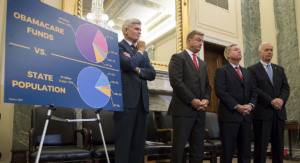The Republican rush to repeal the Affordable Care Act might proceed without a key element that GOP congressmen and women would need to make this critical judgment.
The Congressional Budget Office won’t be able to provide its full analysis of the impact the replacement legislation will have on the future of Americans’ health care insurance.
You see, Congress is facing a Sept. 30 deadline to get this deal done with a simple majority of 50 Senate votes. After that date, the rule rolls back to a 60-vote supermajority requirement. So, there you have it: Senate Republicans don’t want to wait for a “score” that they usually rely on to help them decide matters of this importance.
As Politico reports: The Congressional Budget Office will only have a bare-bones assessment of the latest GOP bill ready before Sept. 30, the deadline for Senate Republicans to pass health care legislation on a party-line vote.
Is it any wonder, then, that some Senate Republican leaders — such as John McCain of Arizona — are critical of the process that is rushing this vote forward?
The ACA is Barack Obama’s signature domestic legislative achievement. Republicans want to wipe it out, toss it aside. They aren’t interested in repairing it, improving it, making it work better for Americans.
In normal times, the complete CBO analysis was thought to be the standard for lawmakers to follow. The CBO is known to be a completely non-partisan, unbiased source to determine the financial impact of legislation. Its previous analyses of efforts to repeal and replace the ACA have told us that 20 million Americans would lose health insurance under terms of the replacement legislation. Are ACA repeal/replace proponents afraid of what the CBO is going to tell us about what they’ve got in mind this time around?
This latest health care insurance bill comes from Sens. Lindsey Graham of South Carolina and Bill Cassidy of Louisiana. Sen. Rand Paul of Kentucky already opposes it. Sen. Susan Collins of Maine is teetering against it. Sen. Lisa Murkowski of Alaska is said to be leaning toward a “no” vote. McCain already is on record opposing this fast-track process.
Is this what we’re getting? Half-baked decision-making based on matters that have little to do with the facts?
